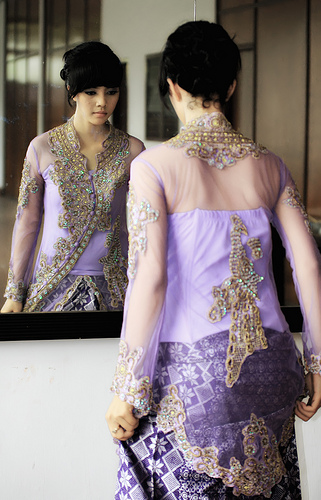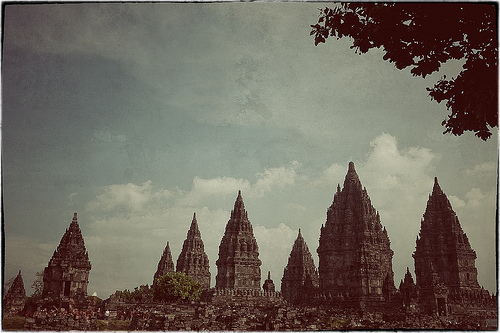
Avie Azis captures beautifully the essence of #LoyarBerkasih, where love is not defined by one popular form. This article thereby kick-starts a week of #LoyarBerkasih2012, only on LoyarBurok.
When death comes and whispers to me,
‘Thy days are ended,’
let me say to him, ‘I have lived in love
and not in mere time.’
He will ask, ‘Will thy songs remain?’
I shall say, ‘I know not, but this I know
that often when I sang I found my eternity.’
— from the poem Fireflies, by Rabindranath Tagore
I LEFT MALAYSIA last year to assist on a research about my own country’s history. Like many Indonesians, I struggle to understand the events surrounding 1965: the alleged communist coup and the consequent politicide which claimed the lives of some 800,000 to 3 million people. During the research, I came to know a woman who was an activist in the Gerakan Wanita Indonesia (Gerwani), a women’s organisation and an onderbouw of the crushed Indonesian Communist Party. Like many Indonesians, she is of small build, but in her 80s, she is still very agile, and full of energy. Grey layers of cataract in her eyes fail to hide the fire burning fervently inside. It took such character to survive 11 years of unjust imprisonment and decades of cruel stigma.
The thing with the kind of research I do is that they are not done in the confines of a sterile, clinical space; and I am never safe from questions from the other side. Often, the roles are reversed and inquiries come from the other direction. That day, at a pause during our interview, it was her who asked me. ‘Jeng, why are all contemporary songs about romance? They’re always about longing for a certain boy/girl. I don’t get it. Why?’ It was a nuanced question—falsely seemed naïve; but in truth the ghost of Karl Marx was swelling up behind her, chanting that familiar credo with a twist: ‘Romance is the opiate of the masses.’ I staggered for an answer.
I browsed my digital music player afterwards, and indeed what she said was true. Of 452 song titles, only around 49 were not about romantic love. We’re the romance-hungry masses, always drunk and intoxicated, pining for a certain, singular person—the ‘you’ who is so special, he or she excludes the rest of humanity. These songs are at odds with her preference. She has this habit of relapsing to songs and quietly humming them to herself—they’re not songs like ones you and I listen to or sing. The only songs for her are, ‘Lagu-lagu revolusioner,’ she said with a huge smile (all her teeth are missing) and a wave of her hand. As if she were conducting an invisible orchestra. She sings about revolutionaries dying in the war of independence against the Dutch. She sings about Kartini, the young Javanese princess turned feminist emancipator. The dozens on the verge of the scaffold, the hundreds who lost their lives, forced into exile and the other thousands in prison. About love for the country. For the people.

At first hearing, I approached her songs with the trained ears of a skeptic. Patriotic songs have become so alien; anachronistic against this time and space. If I were to go to a karaoke now and pick ‘Indonesia Raya,’ people would think I have lost it. No, songs for the country, and the people, they’re only to be sung during the Independence Day, in an aloof state ceremony that has lost all meanings. A show, nothing more. I’ve turned into an unbeliever. Faithless and cynical because I can no longer cope. I am one of those angry Indonesians, burningly resentful after betrayed by the Reformasi in ‘98. Nothing has really changed. When Bersih 2.0. happened, I felt really jealous. Because nobody marches here anymore; we’ve come to an ugly end. I became jaded, almost convinced that my homeland is no longer my home and that I’m over it.
But here was this lady, singing. A different kind of songbird. She who has been betrayed by rulers of the country she has loved even before it came into being. When the military arrested her, they tied her up and dragged half-naked body with her chemise. Somewhere into a river in East Java, they tossed her child in a burlap sack and left her to drown. Her husband and most faithful comrade died while imprisoned in Madura. She was alone. Was spared only 20 minutes in the open air each day. She slept hugging the cold of the women’s prison in Malang, without mattress and blanket. She lost her home and for years her ID card was marked with E.T. (eks tahanan politik, former political prisoner). Yet, I searched and searched and there’s no trace of bitterness in her. ‘Oh no. There was never sadness. I knew from the start there would always be consequences to this great struggle I wage. What happened to me, it was a matter of who’s in power.’

We may disagree with the communist ideology, but (in Indonesia at least), it’s hard to deny that they did work harder than others in reaching out to the people. I pictured her in her youth, riding an old bicycle from one village to another. ‘Sometimes I asked for rides on lorries that carried the timber logs,’ travelling to the more remote parts. Even during imprisonment she fought on: she stole newspapers from the guards, planted new trees, learnt languages. In the autumn of her years, she still dreams of going back to the villages, to the people—to be among them, to build kindergartens, to teach people how to read and write, to prevent young girls from being married off in their early teens, to fight against polygamy. All the gallant actions of her life before prison. She reminds me of the late Václav Havel, who wrote the following line from prison, stubbornly but with a pride to envy, ‘I’m a Czech hayseed and shall remain so.’ I am an Indonesian and always will be. Faith precedes existence, and coming from her, I realised the lyrics are not empty words. They are real, for they took her through times of prison, keeping it alive for her, this love for Indonesia and Indonesians. To hear her sing was a gentle shake out of a troubled dream: Wake up, young one, these are love songs too. Although not for your regular Céladon. And I felt crushed, small with the little-l loves I jealously guarded. My apathy was petty because in reality, I’ve never suffered at all. Do I then really have a right to disappointment?
I think about my music player, the focus on (obsession with?) the romantic lover. I hear it now, the sign of our times: increasing individualism and our disconnect from each other. Aided by these lullabies that permeate our deep, deep slumber, I’ve forgotten about the ones hanged on the scaffold. I forgo my grandfathers’ dream of freedom. People died real deaths and I treated it like fiction. When did we lose that connection: both from the people; and from the history that brought us here?
It is not my intention to glorify communists and nationalists, or to belittle love for the individual—there’s a sacrosanct right to that too (who doesn’t want or couldn’t use a little romance?). But if any, the lesson here, revolutionary Valentines, is not to be fixated on only one form of love alone. Cliché, I know (believe me, I always accuse myself of writing like a moralist). But do go back. Re-trace the steps. If we agree that loving is an art, then it follows the same rule of abstraction: there are techniques before forms, the how before the what, and in most cases, we are not yet the lovers we should be. We’re not. Until our love is proven. And who knows how long it will take? ‘History had a slow pulse,’ wrote Arthur Koestler, ‘man counted in years, history in generations. Perhaps it was still only the second day of creation.’ We’re horribly embattled, maybe, but that hardly means defeat.
—
Slowly as she sings, they come alive, these apparitions, the freedom fighters, my very own, who loved extravagantly. And somewhere along the line, I remember: Her name is Lestari. Unaltered. Enduring. Forever.


A very good article indeed…
A beautiful piece, brought me to tears. =) We have an old Indonesian religious sister in our organisation. When she was explaining about her father, she also sang a song about him. I think music is inborn among Indonesians, it just comes out beautifully, naturally. Inspiring! Kudos!